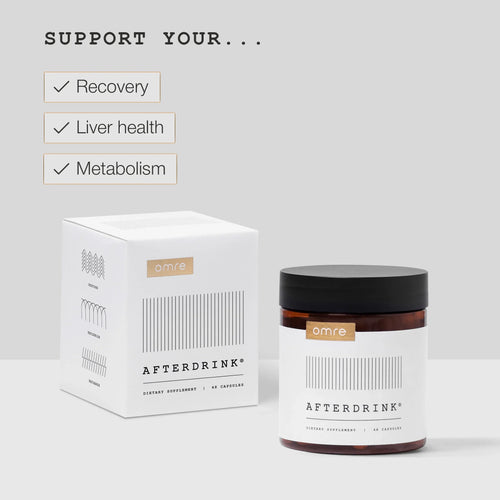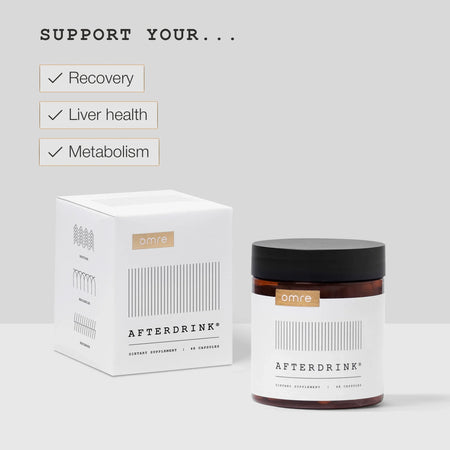Table of Contents
You may have heard that going for a run, pumping some weights, or doing a HIIT will get rid of your hangover.
“sweating out” a hangover is one of the oldest tricks in the book and recommended by many.
But is there any science to back this up?
With so many hangover cure myths out there, it's hard to separate the facts from the fads. In this article, we’re going to take a closer look at the causes of a hangover and whether exercise is a good idea, or something that's best avoided.
AFTERDRINK®
A supercharged antioxidant designed to support recovery, made from the very best, research-backed ingredients on the market.*
How does alcohol affect the body?
The science of hangovers is complicated and involves lots of different pathways. The following factors are some of the main ways that scientists believe we get hangovers:
1. Dehydration
Alcohol is a diuretic which means it makes you produce more urine. It does this by blocking the release of a hormone called vasopressin from your pituitary gland. This hormone is essential for water regulation via your kidneys. As a result, drinking alcohol without proper hydration can lead to dehydration.
2. Poor sleep quality
Alcohol is well-known to reduce sleep quality by preventing your brain from reaching the deeper stages of sleep. In particular, studies show that alcohol blocks your brain from reaching the REM stage of sleep. It’s why you won’t feel fully rested even if you’ve slept enough hours.(1)
3. Inflammation
Alcohol is broken down by your liver to produce toxic by-products such as acetaldehyde. Acetaldehyde is broken down further into harmless acetic acid. Drinking over your limits can result in a build-up of acetaldehyde which is highly toxic. It breaks down to form free radicals which react with your cells causing cellular inflammation.(2)
As a result, you end up with the following common hangover symptoms:
- Headache
- Inability to concentrate
- Irritability
- Nausea and vomiting
- muscle aches
- high heart rate
- lack of energy and focus
Risks of exercise when hungover
If you’ve had a big night out, chances are, your body has been through the works. You’re likely to be dehydrated and levels of inflammation in your muscles are much higher than usual.
Here are some important points to be aware of before choosing to exercise when hungover:
1. Cardiovascular pressure
It's well known that drinking alcohol has an impact on your cardiovascular system. In particular, your resting heart rate is elevated compared to normal. This is thought to occur because of a dysregulation in the autonomic nervous system that controls heart rate variability.(3)(4)
"Holiday heart syndrome is" the name given to arrhythmias that develop after binge drinking in people who don’t have an underlying heart condition. Elevated stress levels and dehydration are thought to be the likely cause of Holiday heart syndrome.(5)
2. Impaired recovery
Binge drinking has a significant impact on the endocrine system, insulin regulation, and protein synthesis. As a result, stress hormones such are cortisol levels are elevated.(6)(7)
The combination of these factors provides a less than ideal environment for muscle function, growth and recovery.
3. Further dehydration
This is an obvious point, but dehydration is exacerbated by exercise as you lose water through sweat. If you've woken up with a hangover, you're likely to be dehydrated already and exercise will compound this.
4. Brain fog
Hangovers are associated with reduced concentration and focus which has been shown to increase the risk of accidents. Recreational skiers have been shown to be prone to more accidents when hungover which you could have probably guessed.(8)
AFTERDRINK®
A supercharged antioxidant designed to support recovery, made from the very best, research-backed ingredients on the market.*
Is exercise good when hungover?
It's not all doom and gloom when it comes to exercising when hungover.
On the flip side, exercise increases the release of endorphins which are "feel good" hormones. Movement can help dissipate stress, increase blood flow and loosen tight muscles and joints.
With that said, these benefits can be achieved with lighter exercises such as yoga and stretching which may be a better option than hitting the gym when hungover.
Can you “sweat out toxins” when hungover?
Lots of people believe that you can "sweat out toxins" which will help shake off a hangover. But unfortunately, there's no logical scientific basis for this.
There are no mysterious "toxins" to sweat out.
By the time you have woken up with a hangover, damage from alcohol and its toxic by-products has already happened. The only things that help at this stage are time, rest, and proper hydration.
Anything else to consider?
Hangovers are a sign from your body that you've been drinking too much alcohol for your liver to handle.
The best way to recover from a hangover is to prevent getting one in the first place. Aside from drinking less alcohol, eating before going out, and keeping well-hydrated help.
In addition, sticking to lighter-colored drinks can also help because they contain fewer congeners. Congeners are biologically active compounds formed naturally when alcohol such as wine and whiskey are made. They are responsible for the distinctive tastes and aromas you get with these drinks. But unfortunately, they are known to make hangovers worse.
Is exercise good for hangovers? - Final verdict
That brings us to the end of our look into exercising when hungover.
Intense exercise is likely to put unnecessary pressure on your recovering body and comes with some risks to be aware of.
On the other hand, exercise can increase “feel-good” neurohormones that may make you feel better in the short term.
Overall, it may be a better idea to rest up and wait until you've fully recovered. However, if you're still keen on some movement when hungover, lighter exercise such as yoga and stretching is preferable.





